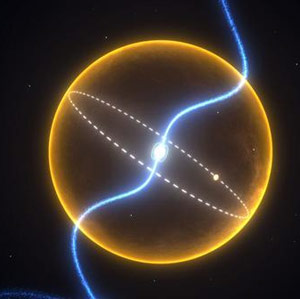澳洲天文學家剛剛發現了一顆他們認為是由鉆石組成的行星。這顆隱藏在星河中的璀璨寶石直徑可能長達6萬公里——是地球直徑的5倍。從它的高密度看,它的大部份原材料應該是碳原子,碳原子互相撞擊構成了水晶般的結構。在天文學家們繪制的彩圖上,這顆“鉆石星球”正圍繞著畫面中央的一顆脈沖星(pulsar)公轉。公轉軌道由虛線表示。藍色的線條代表這顆脈沖星釋放出的無線電波束。脈沖星被認為是質量巨大的恒星通過超新星爆發方式坍塌后遺留下的核心產物,就像一種小小的,已經喪失了活力的,會自轉的恒星。它們的直徑一般僅20公里,卻能每秒發射175次無線電波束,堪稱宇宙中的“燈塔”。鉆石星球的這顆脈沖星距離銀河系大約4000光年之遙。
Astronomers have spotted an exotic planet that seems to be made of diamond racing around a tiny star in our galactic backyard.
The new planet is far denser than any other known so far and consists largely of carbon. Because it is so dense, scientists calculate the carbon must be crystalline, so a large part of this strange world will effectively be diamond.
"The evolutionary history and amazing density of the planet all suggest it is comprised of carbon -- i.e. a massive diamond orbiting a neutron star every two hours in an orbit so tight it would fit inside our own Sun," said Matthew Bailes of Swinburne University of Technology in Melbourne.

Lying 4,000 light years away, or around an eighth of the way toward the center of the Milky Way from the Earth, the planet is probably the remnant of a once-massive star that has lost its outer layers to the so-called pulsar star it orbits.
Pulsars are tiny, dead neutron stars that are only around 20 kilometers (12.4 miles) in diameter and spin hundreds of times a second, emitting beams of radiation.
In the case of pulsar J1719-1438, the beams regularly sweep the Earth and have been monitored by telescopes in Australia, Britain and Hawaii, allowing astronomers to detect modulations due to the gravitational pull of its unseen companion planet.
The measurements suggest the planet, which orbits its star every two hours and 10 minutes, has slightly more mass than Jupiter but is 20 times as dense, Bailes and colleagues reported in the journal Science on Thursday.
In addition to carbon, the new planet is also likely to contain oxygen, which may be more prevalent at the surface and is probably increasingly rare toward the carbon-rich center.
Its high density suggests the lighter elements of hydrogen and helium, which are the main constituents of gas giants like Jupiter, are not present.
Just what this weird diamond world is actually like close up, however, is a mystery.
"In terms of what it would look like, I don't know I could even speculate," said Ben Stappers of the University of Manchester. "I don't imagine that a picture of a very shiny object is what we're looking at here."
相關閱讀
英華人科學家在燭火中發現鉆石
印度推出鑲鉆黃金隱形眼鏡
閃爍!鉆石情結
千真萬確:杰克遜頭發變鉆石
(來源:Agencies/1688網 編輯:崔旭燕)